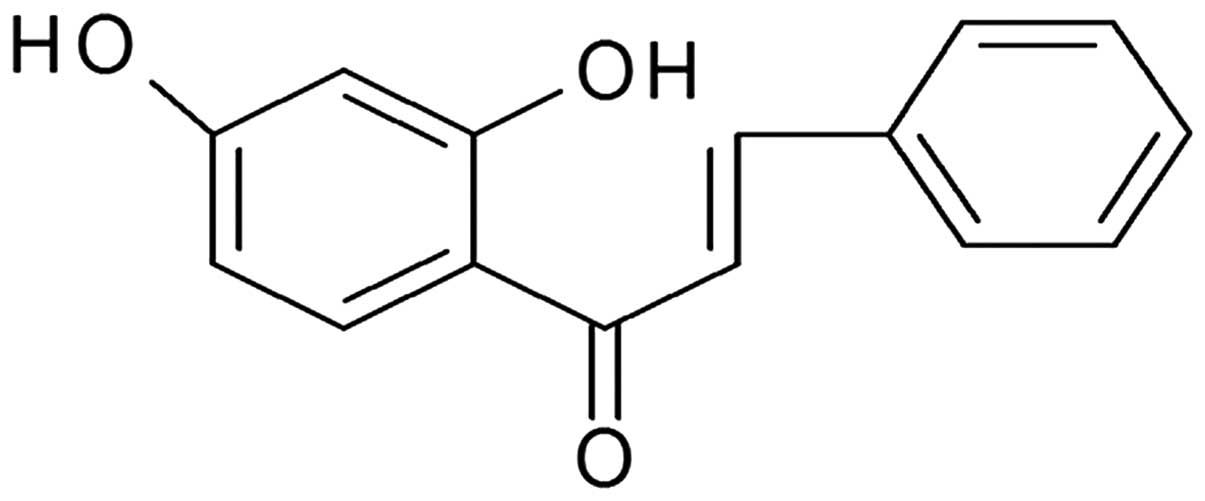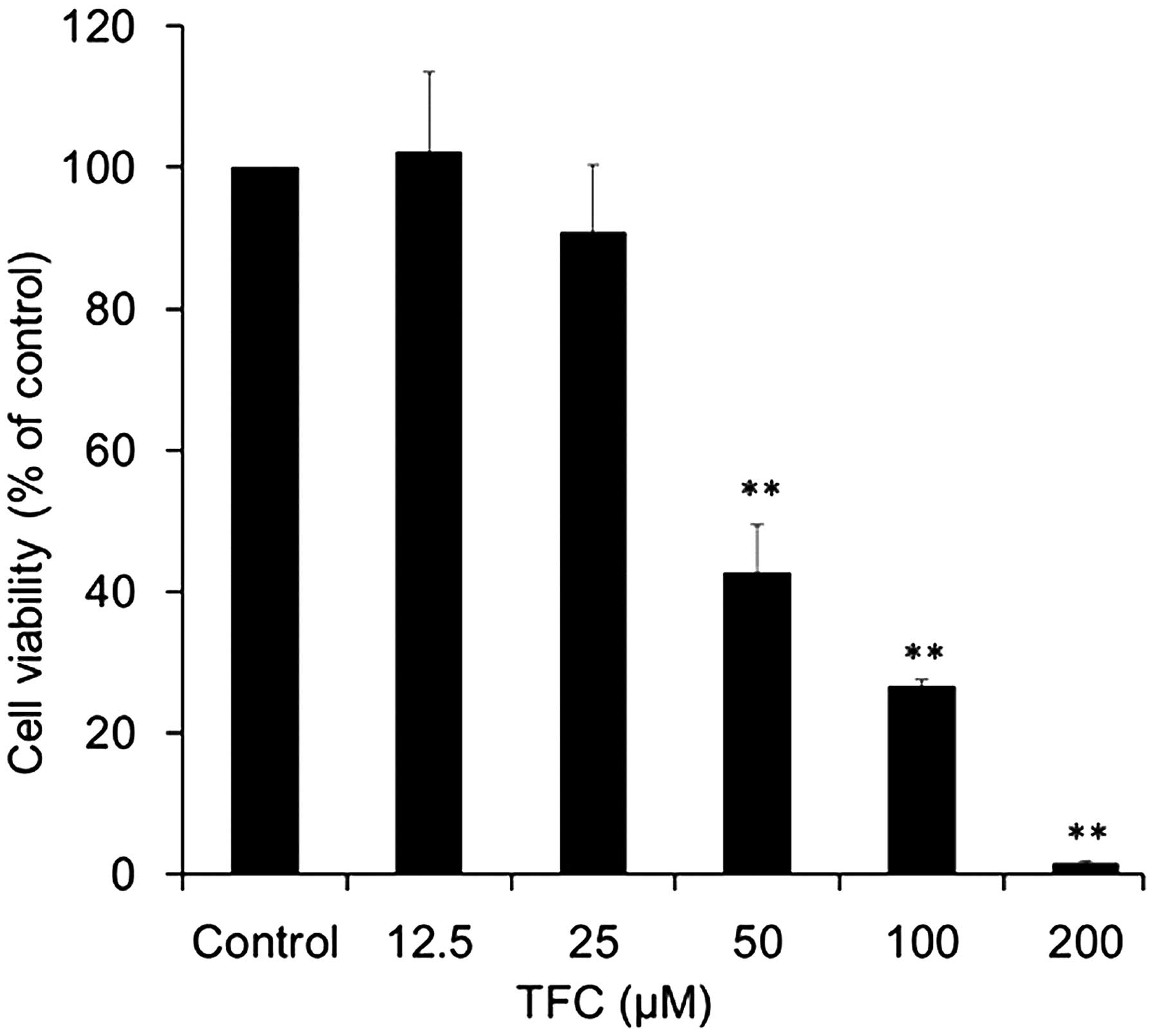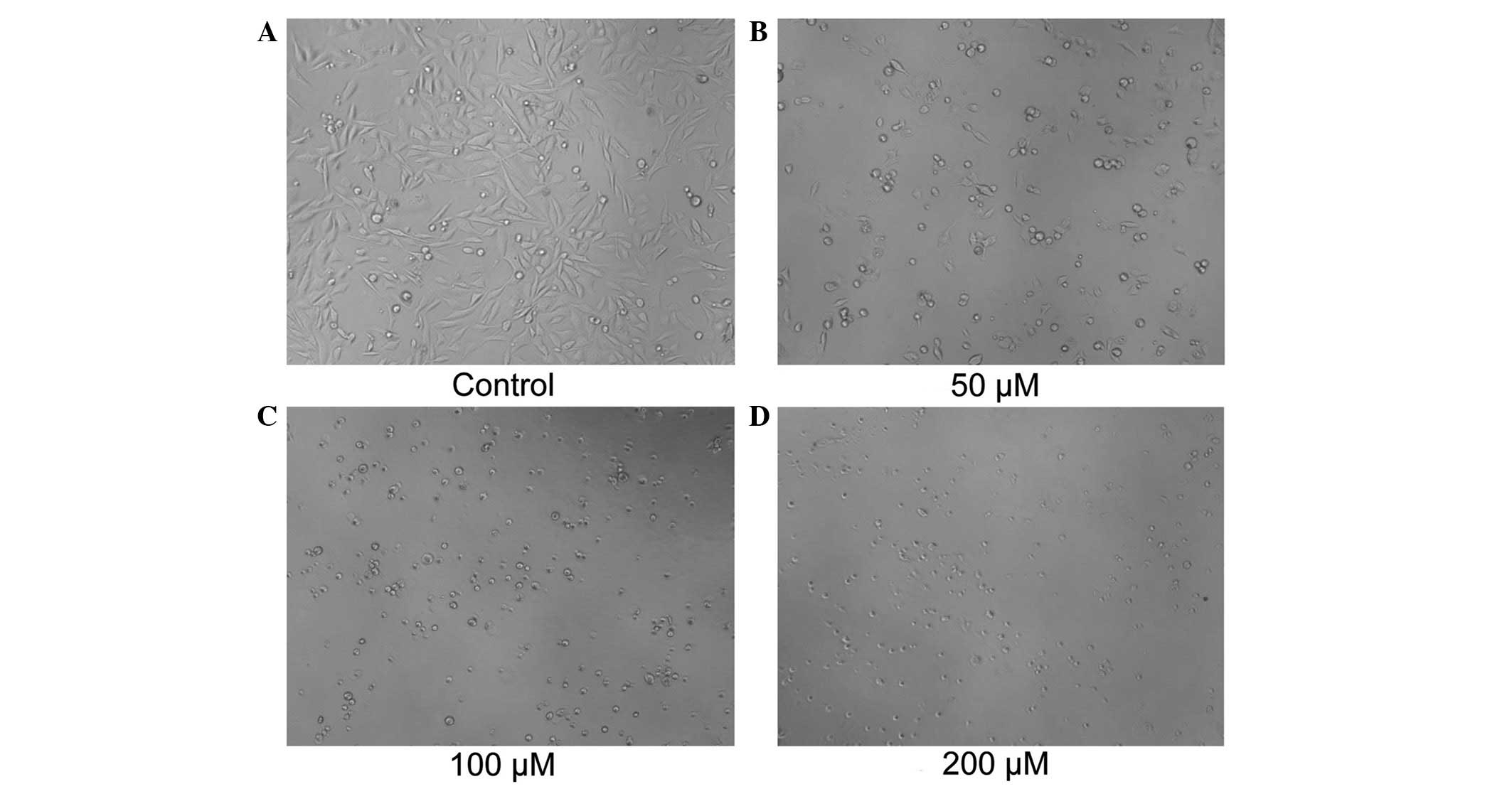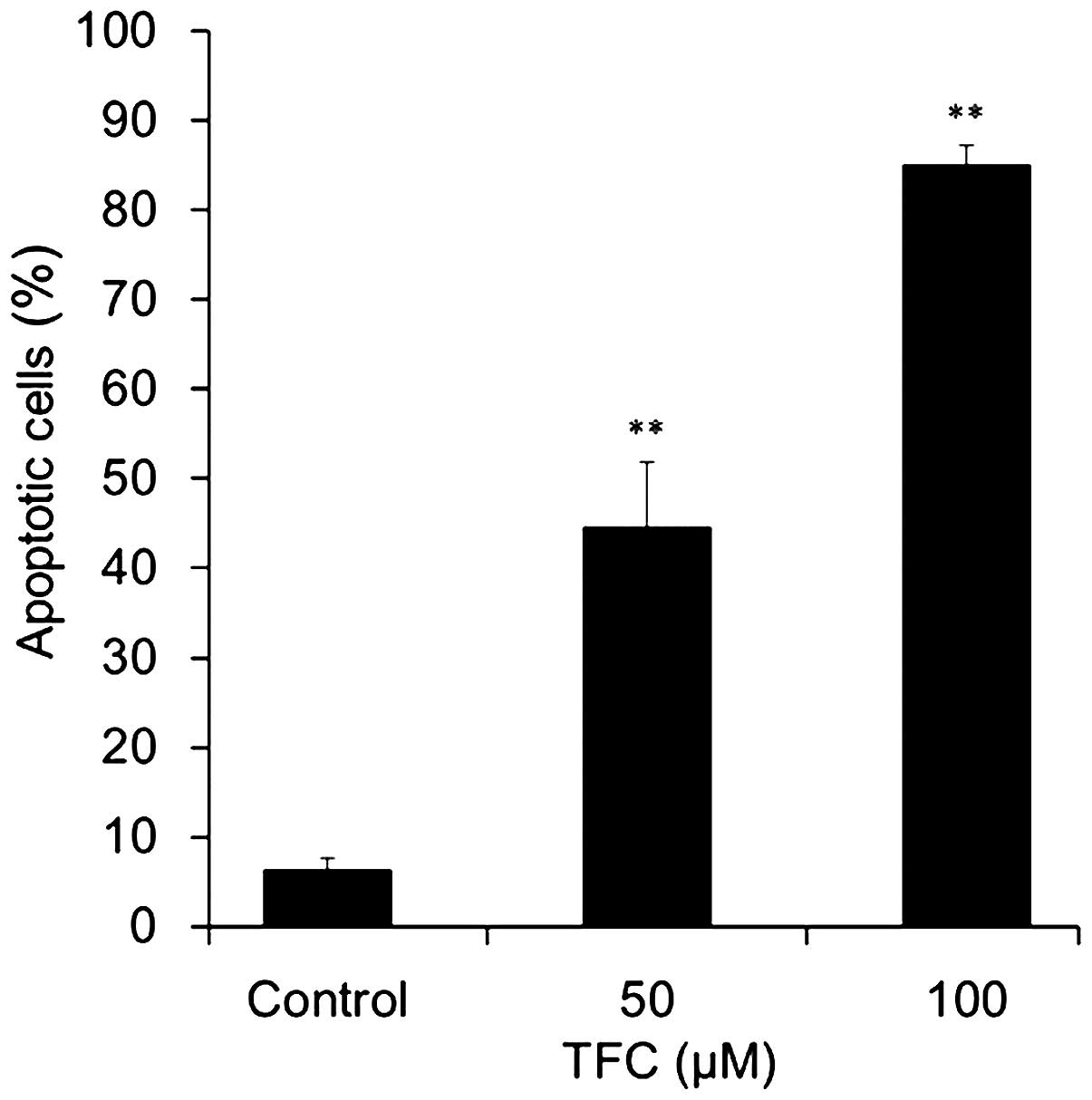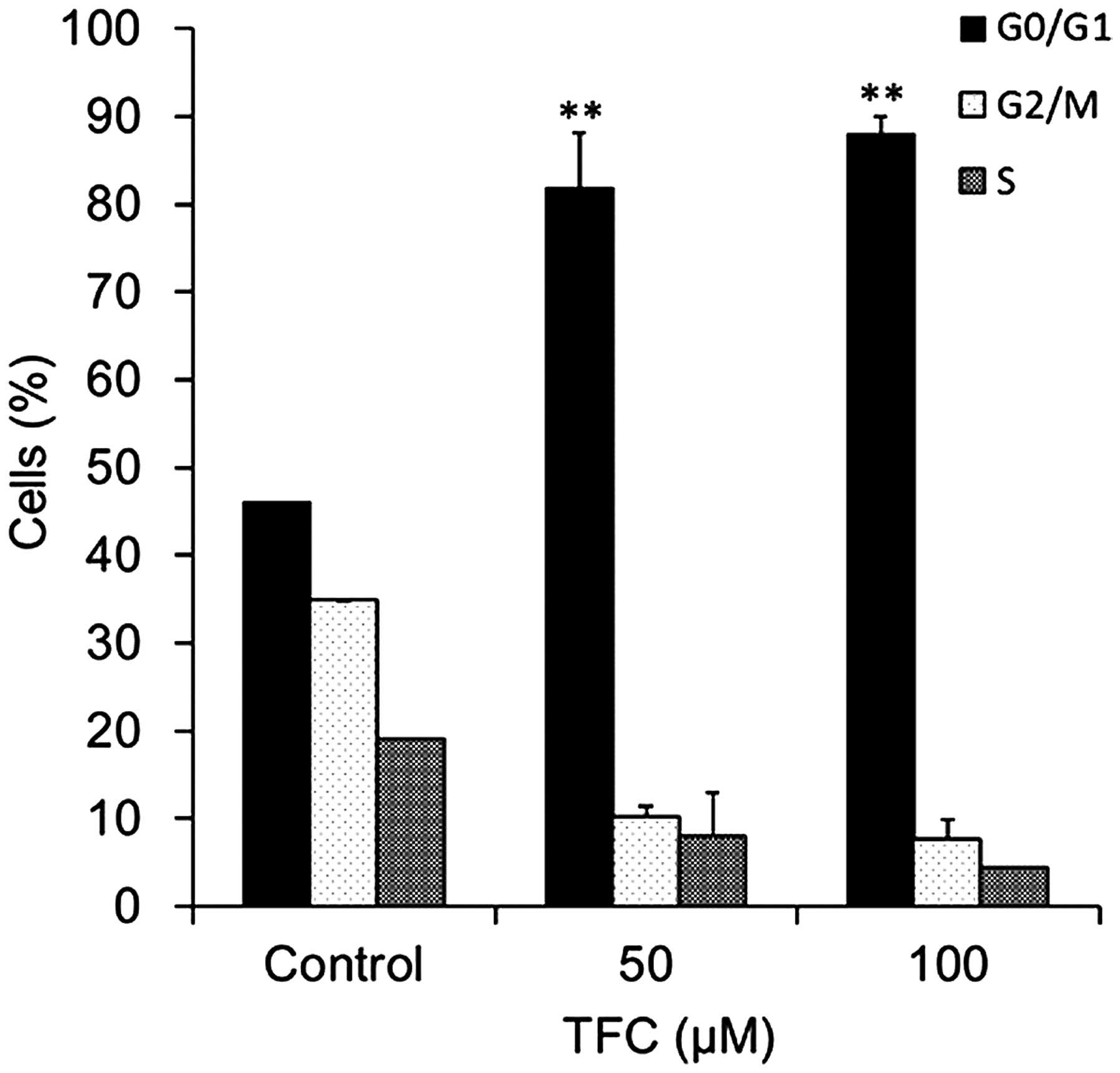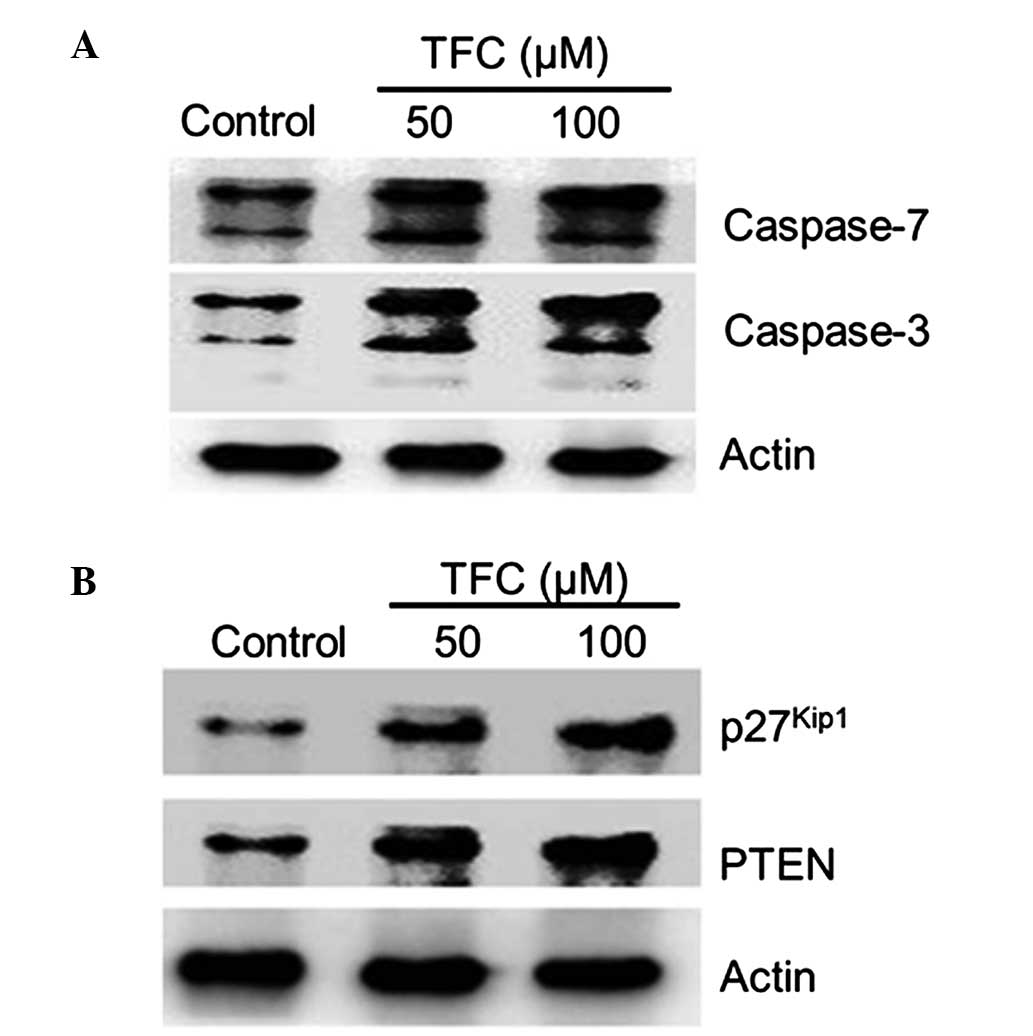|
1
|
Jemal A, Bray F, Center MM, Ferlay J, Ward
E and Forman D: Global cancer statistics. CA Cancer J Clin.
61:69–90. 2011. View Article : Google Scholar : PubMed/NCBI
|
|
2
|
Siegel R, Ma J, Zou Z and Jemal A: Cancer
statistics, 2014. CA Cancer J Clin. 64:9–29. 2014. View Article : Google Scholar : PubMed/NCBI
|
|
3
|
Brawley OW, Barnes S and Parnes H: The
future of prostate cancer prevention. Ann Ny Acad Sci. 952:145–152.
2001. View Article : Google Scholar : PubMed/NCBI
|
|
4
|
Crowell JA: The chemopreventive agent
development research program in the Division of Cancer Prevention
of the US National Cancer Institute: An overview. Eur J Cancer.
41:1889–1910. 2005. View Article : Google Scholar : PubMed/NCBI
|
|
5
|
Yue R, Li B, Shen Y, Zeng H, Li B, Yuan H,
He Y, Shan L and Zhang W: 6-C-methyl flavonoids isolated from Pinus
densata inhibit the proliferation and promote the apoptosis of the
HL-60 human promyelocytic leukaemia cell line. Planta Med.
79:1024–1030. 2013. View Article : Google Scholar : PubMed/NCBI
|
|
6
|
Costa SS, Couceiro JN, Silva IC, Ddo
Malvar C, Coutinho MA, Camargo LM, Muzitano MF and Vanderlinde FA:
Flavonoids in the therapy and prophylaxis of flu: A patent review.
Expert Opin Ther Pat. 22:1111–1121. 2012. View Article : Google Scholar : PubMed/NCBI
|
|
7
|
Wang Y, Chen Y, Wang J, Chen J, Aggarwal
BB, Pang X and Liu M: Xanthohumol, a prenylated chalcone derived
from hops, suppresses cancer cell invasion through inhibiting the
expression of CXCR4 chemokine receptor. Curr Mol Med. 12:153–162.
2012. View Article : Google Scholar : PubMed/NCBI
|
|
8
|
Priyadarsini Vidya R, Murugan Senthil R,
Maitreyi S, Ramalingam K, Karunagaran D and Nagini S: The flavonoid
quercetin induces cell cycle arrest and mitochondria-mediated
apoptosis in human cervical cancer (HeLa) cells through p53
induction and NF-κB inhibition. Eur J Pharmacol. 649:84–91. 2010.
View Article : Google Scholar : PubMed/NCBI
|
|
9
|
Lou CH, Yang GM, Cai H, Zou M, Xu Z, Li Y,
Zhao F, Li W, Tong L, Wang M and Cai B:
2′,4′-Dihydroxychalcone-induced apoptosis of human gastric cancer
MGC-803 cells via down-regulation of survivin mRNA. Toxicol In
Vitro. 24:1333–1337. 2010. View Article : Google Scholar : PubMed/NCBI
|
|
10
|
Chen JJ, Lee HH, Duh CY and Chen IS:
Cytotoxic chalcones of flavonoids from the leaves of Muntingia
calabura. Planta Med. 71:970–973. 2005. View Article : Google Scholar : PubMed/NCBI
|
|
11
|
Pouget C, Lauthier F, Simon A, Fagnere C,
Basly JP, Delage C and Chulia AJ: Flavonoids: Structural
requirements for antiproliferative activity on breast cancer cells.
Bioorg Med Chem Lett. 11:3095–3097. 2001. View Article : Google Scholar : PubMed/NCBI
|
|
12
|
Lou C, Wang M, Yang G, Cai H, Li Y, Zhao
F, Yang H, Tong L and Cai B: Preliminary studies on anti-tumor
activity of 2′,4′-dihydroxychalcone isolated from Herba oxytropis
in human gastric cancer MGC-803 cells. Toxicol In Vitro.
23:906–910. 2009. View Article : Google Scholar : PubMed/NCBI
|
|
13
|
Lu F and Xu XJ: Studies on flavonoids of
Oxytropis falcata. Zhongguo Zhong Yao Zazhi. 32:318–320. 2007.(In
Chinese).
|
|
14
|
Porter AG and Jänicke RU: Emerging roles
of caspase-3 in apoptosis. Cell Death Differ. 6:99–104. 1999.
View Article : Google Scholar : PubMed/NCBI
|
|
15
|
Macri E and Loda M: Role of p27 in
prostate carcinogenesis. Cancer Metastasis Rev. 17:337–344. 1998.
View Article : Google Scholar : PubMed/NCBI
|
|
16
|
Pourmand G, Ziaee AA, Abedi AR, Mehrsai A,
Alavi HA, Ahmadi A and Saadati HR: Role of PTEN gene in progression
of prostate cancer. Urol J. 4:95–100. 2007.PubMed/NCBI
|
|
17
|
Liu Y, Hegde P, Zhang F, Hampton G and Jia
S: Prostate cancer - a biomarker perspective. Front Endocrinol
(Lausanne). 3:722012.PubMed/NCBI
|
|
18
|
Wong RS: Apoptosis in cancer: From
pathogenesis to treatment. J Exp Clin Canc Res. 30:872011.
View Article : Google Scholar
|
|
19
|
Saddoughi SA, Song P and Ogretmen B: Roles
of bioactive sphingolipids in cancer biology and therapeutics.
Subcell Biochem. 49:413–440. 2008. View Article : Google Scholar : PubMed/NCBI
|
|
20
|
Guo YP, Sklar GN, Borkowski A and
Kyprianou N: Loss of the cyclin-dependent kinase inhibitor
p27(Kip1) protein in human prostate cancer correlates with tumor
grade. Clin Cancer Res. 3:2269–2274. 1997.PubMed/NCBI
|
|
21
|
Yang RM, Naitoh J, Murphy M, Wang HJ,
Phillipson J, de Kernion JB, Loda M and Reiter RE: Low p27
expression predicts poor disease-free survival in patients with
prostate cancer. J Urol. 159:941–945. 1998. View Article : Google Scholar : PubMed/NCBI
|
|
22
|
Tsihlias J, Kapusta LR, DeBoer G,
Morava-Protzner I, Zbieranowski I, Bhattacharya N, Catzavelos GC,
Klotz LH and Slingerland JM: Loss of cyclin-dependent kinase
inhibitor p27Kip1 is a novel prognostic factor in localized human
prostate adenocarcinoma. Cancer Res. 58:542–548. 1998.PubMed/NCBI
|
|
23
|
Cordon-Cardo C, Koff A, Drobnjak M,
Capodieci P, Osman I, Millard SS, Gaudin PB, Fazzari M, Zhang ZF,
Massague J and Scher HI: Distinct altered patterns of p27Kip1 gene
expression in benign prostatic hyperplasia and prostatic carcinoma.
J Natl Cancer Inst. 90:1284–1291. 1998. View Article : Google Scholar : PubMed/NCBI
|
|
24
|
Kato JY, Matsuoka M, Polyak K, Massague J
and Sherr CJ: Cyclic AMP-induced G1 phase arrest mediated by an
inhibitor (p27Kip1) of cyclin-dependent kinase 4 activation. Cell.
79:487–496. 1994. View Article : Google Scholar : PubMed/NCBI
|
|
25
|
Le XF, Claret FX, Lammayot A, Tian L,
Deshpande D, LaPushin R, Tari AM and Bast RC Jr: The role of
cyclin-dependent kinase inhibitor p27Kip1 in anti-HER2
antibody-induced G1 cell cycle arrest and tumor growth inhibition.
J Biol Chem. 278:23441–23450. 2003. View Article : Google Scholar : PubMed/NCBI
|
|
26
|
Chu EC and Tarnawski AS: PTEN regulatory
functions in tumor suppression and cell biology. Med Sci Monit.
10:RA235–RA241. 2004.PubMed/NCBI
|
|
27
|
Furnari FB, Huang HJ and Cavenee WK: The
phosphoinositol phosphatase activity of PTEN mediates a
serum-sensitive G1 growth arrest in glioma cells. Cancer Res.
58:5002–5008. 1998.PubMed/NCBI
|
|
28
|
Persad S, Attwell S, Gray V, Delcommenne
M, Troussard A, Sanghera J and Dedhar S: Inhibition of
integrin-linked kinase (ILK) suppresses activation of protein
kinase B/Akt and induces cell cycle arrest and apoptosis of
PTEN-mutant prostate cancer cells. Proc Natl Acad Sci USA.
97:3207–3212. 2000. View Article : Google Scholar : PubMed/NCBI
|
|
29
|
Backman SA, Ghazarian D, So K, Sanchez O,
Wagner KU, Hennighausen L, Suzuki A, Tsao MS, Chapman WB, Stambolic
V and Mak TW: Early onset of neoplasia in the prostate and skin of
mice with tissue-specific deletion of Pten. Proc Natl Acad Sci USA.
101:1725–1730. 2004. View Article : Google Scholar : PubMed/NCBI
|
|
30
|
Xie F, Su M, Qiu W, Zhang M, Guo Z, Su B,
Liu J, Li X and Zhou L: Kaempferol promotes apoptosis in human
bladder cancer cells by inducing the tumor suppressor, PTEN. Int J
Mol Sci. 14:21215–21226. 2013. View Article : Google Scholar : PubMed/NCBI
|
|
31
|
Mamillapalli R, Gavrilova N, Mihaylova VT,
Tsvetkov LM, Wu H, Zhang H and Sun H: PTEN regulates the
ubiquitin-dependent degradation of the CDK inhibitor p27(Kip1)
through the ubiquitin E3 ligase SCF(SKP2). Curr Biol. 11:263–267.
2001. View Article : Google Scholar : PubMed/NCBI
|















